Susan Price's Blog: Susan Price's Nennius Blog, page 14
July 19, 2013
A Scattering of Authors
I haven't posted a blog for a couple of weeks.
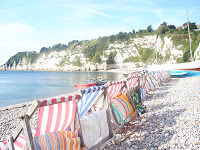
Blame the summer.
You have to rush out and soak up the sun when you can in Britain, so for part of that two weeks, I was away in Devon.
Last week, I was in Oxfordshire for the 2013 Scattered Authors Society Conference.
This has been held annually for over ten years now, in a beautiful medieval manor house, in a small English village.
Scattered Authors from all over Britain gather there, from Monday to Thursday.
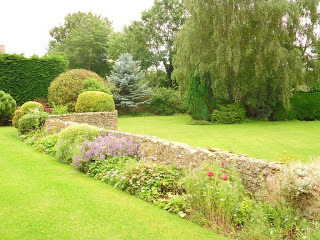 It's a gab-fest, a chance to catch up with friends, an opportunity to learn new workshop techniques to take into school sessions, to pick the brains of other authors about editors and publishers, to drink Pimms in a sunny garden while swallows and swifts dive and soar - and, above all, to talk about writing with other people who really understand what you're talking about and why you love it.
It's a gab-fest, a chance to catch up with friends, an opportunity to learn new workshop techniques to take into school sessions, to pick the brains of other authors about editors and publishers, to drink Pimms in a sunny garden while swallows and swifts dive and soar - and, above all, to talk about writing with other people who really understand what you're talking about and why you love it.
The gathered authors - nearly thirty of them - ate in the stone-floored undercroft. The food is excellent; the talk almost non-stop.
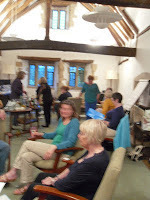 We met mostly in the lovely solar, with its great chimney-breast, its wooden beams and stone-framed windows. A small private chapel opens off it. Every session begins with a five minute read, where one of the writers reads aloud, usually from a book they're writing. Celia Rees says that every book she's read from at Charney has won a contract!
We met mostly in the lovely solar, with its great chimney-breast, its wooden beams and stone-framed windows. A small private chapel opens off it. Every session begins with a five minute read, where one of the writers reads aloud, usually from a book they're writing. Celia Rees says that every book she's read from at Charney has won a contract!
Celia, Mary Hoffman and Penny Dolan combined their experience of travelling abroad as writers to give us some tips. Anticipate disaster! - that's their advice. And if it's for work, claim expenses against tax. The discussion afterwards brought up more experiences, and advice.
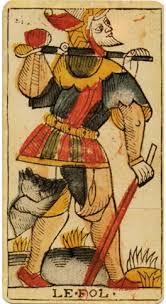 Jenny Alexander gave us a wonderful workshop session, using the greater arcana from the tarot cards. She pointed out that these intriguing distillations of dream images can be used for meditation and to inspire stories and poems. Jenny is always inspirational.
Jenny Alexander gave us a wonderful workshop session, using the greater arcana from the tarot cards. She pointed out that these intriguing distillations of dream images can be used for meditation and to inspire stories and poems. Jenny is always inspirational.
Katherine Roberts led a session bringing us up to date on e-publishing and her adventures in it. I chipped in where I could, with my own experience. Kath provided lots of advice, and emailed us all a list of the sites she'd mentioned, with links.
Dianne Hofmeyr led a very enjoyable drawing workshop - but Di's triumph was the performance she gave of her book, The Bojabi Tree. She sang, she danced, she acted, and it was a joy - though Julia Jarman almost stole the show with an impromptu and funny impersonation of a tortoise.
But, as ever, the most vital thing about the Scattered Authors Conference was being there, talking and laughing - there is always almost non-stop laughter at Charney.
Here's one last toast to all the Scattered Authors - success!
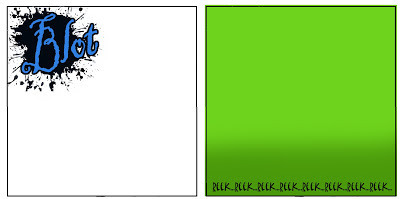
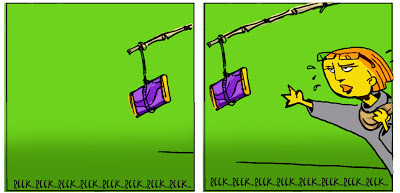
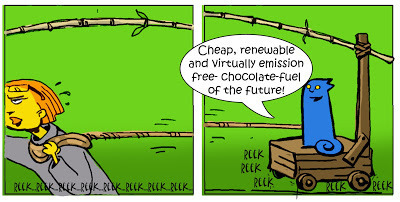

Blame the summer.
You have to rush out and soak up the sun when you can in Britain, so for part of that two weeks, I was away in Devon.
Last week, I was in Oxfordshire for the 2013 Scattered Authors Society Conference.
This has been held annually for over ten years now, in a beautiful medieval manor house, in a small English village.
Scattered Authors from all over Britain gather there, from Monday to Thursday.
 It's a gab-fest, a chance to catch up with friends, an opportunity to learn new workshop techniques to take into school sessions, to pick the brains of other authors about editors and publishers, to drink Pimms in a sunny garden while swallows and swifts dive and soar - and, above all, to talk about writing with other people who really understand what you're talking about and why you love it.
It's a gab-fest, a chance to catch up with friends, an opportunity to learn new workshop techniques to take into school sessions, to pick the brains of other authors about editors and publishers, to drink Pimms in a sunny garden while swallows and swifts dive and soar - and, above all, to talk about writing with other people who really understand what you're talking about and why you love it. The gathered authors - nearly thirty of them - ate in the stone-floored undercroft. The food is excellent; the talk almost non-stop.
 We met mostly in the lovely solar, with its great chimney-breast, its wooden beams and stone-framed windows. A small private chapel opens off it. Every session begins with a five minute read, where one of the writers reads aloud, usually from a book they're writing. Celia Rees says that every book she's read from at Charney has won a contract!
We met mostly in the lovely solar, with its great chimney-breast, its wooden beams and stone-framed windows. A small private chapel opens off it. Every session begins with a five minute read, where one of the writers reads aloud, usually from a book they're writing. Celia Rees says that every book she's read from at Charney has won a contract!Celia, Mary Hoffman and Penny Dolan combined their experience of travelling abroad as writers to give us some tips. Anticipate disaster! - that's their advice. And if it's for work, claim expenses against tax. The discussion afterwards brought up more experiences, and advice.
 Jenny Alexander gave us a wonderful workshop session, using the greater arcana from the tarot cards. She pointed out that these intriguing distillations of dream images can be used for meditation and to inspire stories and poems. Jenny is always inspirational.
Jenny Alexander gave us a wonderful workshop session, using the greater arcana from the tarot cards. She pointed out that these intriguing distillations of dream images can be used for meditation and to inspire stories and poems. Jenny is always inspirational.Katherine Roberts led a session bringing us up to date on e-publishing and her adventures in it. I chipped in where I could, with my own experience. Kath provided lots of advice, and emailed us all a list of the sites she'd mentioned, with links.
Dianne Hofmeyr led a very enjoyable drawing workshop - but Di's triumph was the performance she gave of her book, The Bojabi Tree. She sang, she danced, she acted, and it was a joy - though Julia Jarman almost stole the show with an impromptu and funny impersonation of a tortoise.
But, as ever, the most vital thing about the Scattered Authors Conference was being there, talking and laughing - there is always almost non-stop laughter at Charney.
Here's one last toast to all the Scattered Authors - success!



Published on July 19, 2013 16:05
June 28, 2013
In Conversation with Sanna Lehtonen
My conversation today is with Dr. Sanna Lehtonen,
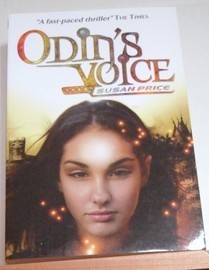 'Odin's Voice' by Susan Pricepostdoctoral researcher at Tilburg School of Humanities.
'Odin's Voice' by Susan Pricepostdoctoral researcher at Tilburg School of Humanities.
I was working on a blog once, and wanted to add the cover of one of my books. Being too idle to hunt through my files for the jpeg I wanted, I thought I would search on Google instead - and Google brought me '"I'm Glad I Was Designed": Un/doing Gender and Class in Susan Price's 'Odin Trilogy'" by Sanna Lehtonen.
I was fairly gobsmacked to find that anyone had bothered to do so much thinking about one of my books, and thought I'd get in touch and say thanks. I was also quite curious about Sanna's work, and she agreed to talk a bit about it.
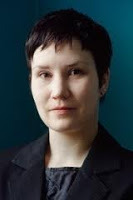 Dr Sana Lehtonen
Dr Sana Lehtonen
Sue: What drew you to your field of study? I think my readers are used to writers talking about how they write a book but I think your point of view would add something new.
Sanna: Well, my passion for books, I suppose. Especially books that change your life, take you into unknown worlds and make you think in new ways. I learned to read when I was five and have been reading ferociously ever since. Even though I’ve read all kinds of stuff, my preference has always been for works that have fantastic or surreal elements. I’m not sure why. Maybe because I’ve always been interested in things that can’t quite be explained and I like to read to be surprised or disturbed. Also in terms of gender, which is my main research interest.
When I was writing my MA thesis on Rowling’s Harry Potter books ten years ago, I read a lot of research that stated that fantasy is often very conventional and conservative as regards gendered representations.
Sue: I’ve come across that a lot too!
Sanna: I thought this to be very strange because my childhood favourites included books such as Astrid Lindgren’s Ronia The Robber’s Daughter and Michael Ende’s Momo that involved young girl heroes that were not, to me, conventional at all. My feeling was that it is namely fantasy that can experiment with gender in ways that are not possible in realist literature.
I had also heard so many times before that fantasy is not serious literature – Finland has a very strong tradition of realist literature and during the recent years some people have actually been worried about the way in which fantasy is now taking over the world of children’s literature publishing. In my research, I’ve wanted to show that fantasy should be taken seriously. I don’t know whether fantasy itself should be “serious” (I don’t like that word) but it can definitely be meaningful and work in subversive ways.
Sue: It’s a curious idea, isn’t it, that fantasy isn’t serious? By that definition, Utopia isn’t serious, and any speculative fiction that questions and satirises our present society by contrasting it with a fantasy or invented future society (as Pratchett’s Disc-World novels often do) is merely frivolous with no serious intent at all. It’s a very narrow view. But how did you become a researcher?
Sanna: Ending up as a researcher was partly a coincidence. I always thought that if I ever finish a book, it will be fiction. I never dreamed of becoming a researcher of literature – at some point of my life I did dream of becoming of an archeologist but someone told me then that there are no jobs for archeologists. After this, I actually started my studies at the university as a musicologist and that involved a lot of research training. I liked it but was then realizing that there are not too many jobs for musicologists either and switched my major subject into English language and literature, to be able to find a job as a language teacher, if nothing else. And then ended up working as a piano teacher for a while, before I was lured into writing a doctoral dissertation about gender in children’s fantasy literature.
Sue: Wow! You’re very talented! – But I’m not really surprised to learn how creative and talented you are, because I think the way you closely examine and interprete a book is creation, rather like an actor's interpretation of a role. You often tell the writer something they didn't know about their own book!
Sanna: That almost makes me sound like a therapist who digs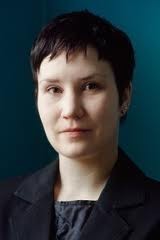 deep into the subconscious of books... Although I’m not really such a big fan of psychoanalytical readings. I’d like to think that all readers find things in books that their authors have no idea of. Of course I’m trained to dissect texts, so I tend to close read almost habitually.
deep into the subconscious of books... Although I’m not really such a big fan of psychoanalytical readings. I’d like to think that all readers find things in books that their authors have no idea of. Of course I’m trained to dissect texts, so I tend to close read almost habitually.
Then again, I did some kind of close reading even before I started my studies because I always went back to my favourite books and found that they were different every time I reread them. I remembered the story but I didn’t remember the details and it often felt like there were things there that surely had not been there the previous time. I always found that very exciting. I suppose I just have to examine things to find out how their magic works and then, to my great delight, realize that I can explain parts of their magic but not everything.
I very much like the idea of interpretation of a book being another kind of creation. Since I’m a musician, I think I’d go for that analogy rather than acting, though. Interpreting a book might be a bit like playing someone else’s composition. The sheet music and instructions are there to guide me but when I play a piece on my piano, the performance will also be about my interpretation of the music. But there are limits to that interpretation and a lot of formal training is involved, as for literary analysis. It’s still fun!
Sue: I love that analogy! I’m very happy to think of you re-interpreting my books as if they were sheet music.
Sanna: You’ve written a lot of books and stories that are either retellings or rewritings – how does the process of retelling or rewriting work for you? Are you very conscious about making certain changes to previous texts in your own version, or do you just have the stories in the back of your mind when you start creating your own works?
Sue: I think it’s a little of both. My book Crack A Story is a collection of retold folk-tales, and every one has a brave, active heroine. Some of them are retold as I found them – more or less – because many folk-tales have courageous female characters who drive the tale. But some of the stories in the collection I deliberately changed to make them about a heroine rather than a hero. The stories worked just as well! I’ve retold a lot of folk-tales over the years, and my attitude to retelling them has changed. My first collection The Carpenter and Other Stories I now see as a little stilted. I thought, then, that I had to be ‘true to my sources’ and although I retold the tale in my own words, I told them in rather formal English. I blended versions of tales together, to keep incidents I liked. I’d add an ending from another source, if I liked it better – but I stayed far closer to the tale as I’d found it. Then it slowly dawned on me that the source I was being true to was far removed from the original telling. I had found the story in a collection made by a 19thCentury vicar, or academic folklorist, and the formal style came from them. I think I should have realised this sooner, but once it did dawn on me, I started retelling old stories in a far looser, freer way, which I enjoyed much more.
But thank you, Sanna, for this talk - I really enjoyed it!
Another of Sanna's essays can be read here: 'If You Thought This Story Sour, Sweeten It With Your Own Telling': Cross-Cultural Intertextuality and a Feminist Poetics of Rewriting in Susan Price's Ghost Dance.
Biographical information: Sanna Lehtonen is a PhD candidate at the University of Jyväskylä, Finland and at Macquarie University, Australia, working on her dissertation on invisibility, magic changes in age and girlhood in contemporary British children’s fantasy. Contact: sanlehto@jyu.fi
Ninja Driving Note: I failed to earn a 'good' for my left-hand reverse last week. I am still merely 'average to good.' Though it was said I'd improved, and the column now has a string of 'Gs' for 'good' on everything else. I don't know if there's a mark above 'good.'
This week I'm to do a 'pre-test trial run' - which I confidently expect to fail, so no pressure. Altogether now: 'Only a fool breaks the two-second rule.'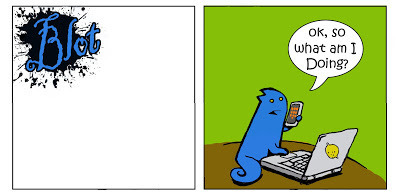
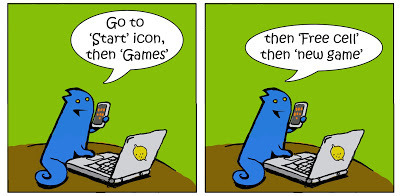
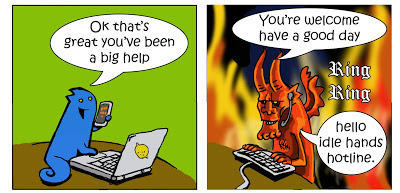
 'Odin's Voice' by Susan Pricepostdoctoral researcher at Tilburg School of Humanities.
'Odin's Voice' by Susan Pricepostdoctoral researcher at Tilburg School of Humanities.I was working on a blog once, and wanted to add the cover of one of my books. Being too idle to hunt through my files for the jpeg I wanted, I thought I would search on Google instead - and Google brought me '"I'm Glad I Was Designed": Un/doing Gender and Class in Susan Price's 'Odin Trilogy'" by Sanna Lehtonen.
I was fairly gobsmacked to find that anyone had bothered to do so much thinking about one of my books, and thought I'd get in touch and say thanks. I was also quite curious about Sanna's work, and she agreed to talk a bit about it.
 Dr Sana Lehtonen
Dr Sana LehtonenSue: What drew you to your field of study? I think my readers are used to writers talking about how they write a book but I think your point of view would add something new.
Sanna: Well, my passion for books, I suppose. Especially books that change your life, take you into unknown worlds and make you think in new ways. I learned to read when I was five and have been reading ferociously ever since. Even though I’ve read all kinds of stuff, my preference has always been for works that have fantastic or surreal elements. I’m not sure why. Maybe because I’ve always been interested in things that can’t quite be explained and I like to read to be surprised or disturbed. Also in terms of gender, which is my main research interest.
When I was writing my MA thesis on Rowling’s Harry Potter books ten years ago, I read a lot of research that stated that fantasy is often very conventional and conservative as regards gendered representations.
Sue: I’ve come across that a lot too!
Sanna: I thought this to be very strange because my childhood favourites included books such as Astrid Lindgren’s Ronia The Robber’s Daughter and Michael Ende’s Momo that involved young girl heroes that were not, to me, conventional at all. My feeling was that it is namely fantasy that can experiment with gender in ways that are not possible in realist literature.
I had also heard so many times before that fantasy is not serious literature – Finland has a very strong tradition of realist literature and during the recent years some people have actually been worried about the way in which fantasy is now taking over the world of children’s literature publishing. In my research, I’ve wanted to show that fantasy should be taken seriously. I don’t know whether fantasy itself should be “serious” (I don’t like that word) but it can definitely be meaningful and work in subversive ways.
Sue: It’s a curious idea, isn’t it, that fantasy isn’t serious? By that definition, Utopia isn’t serious, and any speculative fiction that questions and satirises our present society by contrasting it with a fantasy or invented future society (as Pratchett’s Disc-World novels often do) is merely frivolous with no serious intent at all. It’s a very narrow view. But how did you become a researcher?
Sanna: Ending up as a researcher was partly a coincidence. I always thought that if I ever finish a book, it will be fiction. I never dreamed of becoming a researcher of literature – at some point of my life I did dream of becoming of an archeologist but someone told me then that there are no jobs for archeologists. After this, I actually started my studies at the university as a musicologist and that involved a lot of research training. I liked it but was then realizing that there are not too many jobs for musicologists either and switched my major subject into English language and literature, to be able to find a job as a language teacher, if nothing else. And then ended up working as a piano teacher for a while, before I was lured into writing a doctoral dissertation about gender in children’s fantasy literature.
Sue: Wow! You’re very talented! – But I’m not really surprised to learn how creative and talented you are, because I think the way you closely examine and interprete a book is creation, rather like an actor's interpretation of a role. You often tell the writer something they didn't know about their own book!
Sanna: That almost makes me sound like a therapist who digs
 deep into the subconscious of books... Although I’m not really such a big fan of psychoanalytical readings. I’d like to think that all readers find things in books that their authors have no idea of. Of course I’m trained to dissect texts, so I tend to close read almost habitually.
deep into the subconscious of books... Although I’m not really such a big fan of psychoanalytical readings. I’d like to think that all readers find things in books that their authors have no idea of. Of course I’m trained to dissect texts, so I tend to close read almost habitually. Then again, I did some kind of close reading even before I started my studies because I always went back to my favourite books and found that they were different every time I reread them. I remembered the story but I didn’t remember the details and it often felt like there were things there that surely had not been there the previous time. I always found that very exciting. I suppose I just have to examine things to find out how their magic works and then, to my great delight, realize that I can explain parts of their magic but not everything.
I very much like the idea of interpretation of a book being another kind of creation. Since I’m a musician, I think I’d go for that analogy rather than acting, though. Interpreting a book might be a bit like playing someone else’s composition. The sheet music and instructions are there to guide me but when I play a piece on my piano, the performance will also be about my interpretation of the music. But there are limits to that interpretation and a lot of formal training is involved, as for literary analysis. It’s still fun!
Sue: I love that analogy! I’m very happy to think of you re-interpreting my books as if they were sheet music.
Sanna: You’ve written a lot of books and stories that are either retellings or rewritings – how does the process of retelling or rewriting work for you? Are you very conscious about making certain changes to previous texts in your own version, or do you just have the stories in the back of your mind when you start creating your own works?
Sue: I think it’s a little of both. My book Crack A Story is a collection of retold folk-tales, and every one has a brave, active heroine. Some of them are retold as I found them – more or less – because many folk-tales have courageous female characters who drive the tale. But some of the stories in the collection I deliberately changed to make them about a heroine rather than a hero. The stories worked just as well! I’ve retold a lot of folk-tales over the years, and my attitude to retelling them has changed. My first collection The Carpenter and Other Stories I now see as a little stilted. I thought, then, that I had to be ‘true to my sources’ and although I retold the tale in my own words, I told them in rather formal English. I blended versions of tales together, to keep incidents I liked. I’d add an ending from another source, if I liked it better – but I stayed far closer to the tale as I’d found it. Then it slowly dawned on me that the source I was being true to was far removed from the original telling. I had found the story in a collection made by a 19thCentury vicar, or academic folklorist, and the formal style came from them. I think I should have realised this sooner, but once it did dawn on me, I started retelling old stories in a far looser, freer way, which I enjoyed much more.
But thank you, Sanna, for this talk - I really enjoyed it!
Another of Sanna's essays can be read here: 'If You Thought This Story Sour, Sweeten It With Your Own Telling': Cross-Cultural Intertextuality and a Feminist Poetics of Rewriting in Susan Price's Ghost Dance.
Biographical information: Sanna Lehtonen is a PhD candidate at the University of Jyväskylä, Finland and at Macquarie University, Australia, working on her dissertation on invisibility, magic changes in age and girlhood in contemporary British children’s fantasy. Contact: sanlehto@jyu.fi
Ninja Driving Note: I failed to earn a 'good' for my left-hand reverse last week. I am still merely 'average to good.' Though it was said I'd improved, and the column now has a string of 'Gs' for 'good' on everything else. I don't know if there's a mark above 'good.'
This week I'm to do a 'pre-test trial run' - which I confidently expect to fail, so no pressure. Altogether now: 'Only a fool breaks the two-second rule.'



Published on June 28, 2013 16:05
June 21, 2013
Secret Ninja Driving
Another thing taking up my time these days is taking a
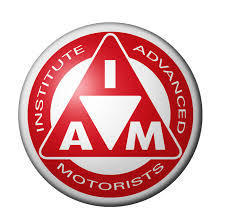 driving course with the Institute of Advanced Motorists.
driving course with the Institute of Advanced Motorists.
Some people I've mentioned this too seem to think I'm studying some kind of secret ninja driving, but it's nothing like that.
I'm studying the Highway Code again, and the book on Advanced Driving, which was written for drivers of emergency vehicles (so it tells you to concentrate on what's happening around you now, and not to think about 'the incident you're attending'.) I watch these videos by Chris Gilbert, and every Sunday I go out for an 'observed drive' with my mentor, a retired ambulance driver. He gives his time for nothing, and stresses that he is not a driving instructor. I am in complete control of the car at all times, and responsible for it, and he is there only to observe how I drive and offer tips on how I might improve.
Most of what is taught by the Advanced Drivers (many of whom prefer to call themselves 'Aware Drivers') is also taught to learner drivers by their instructors. It's already known by most drivers, and used by them most of the time, or, at least, some of the time. I own up to the fact that I'm refreshing skills rather than learning anything new - skills that I was taught, but forgot, or never completely mastered, or allowed to become sloppy.
I mean things like the proper way to hold the gear-stick in order to minimise the chance of going into the wrong gear: the position to take up on the road to allow you the greatest range of vision: the best gear to take at any particular speed or road position, to ease wear and tear on the car and save petrol.
What I'm learning is to apply this knowledge in a consistent, all-enveloping way - to change gear correctly every single time; to check mirrors immediately on observing every and any hazard, every time; to constantly observe what's developing in the distance, nearby and to the rear of my car.
It's quite Zen, in as much as it requires you to be 'in the moment' all the time. I can't allow my mind to drift off into plot construction or work on my 'To-Do List.' You can't do things by rote, or out of habit. Each use of the indicator has to be decided as a unique action, and not done automatically: is their any road-user who would benefit from the signal? If not, don't signal.
Straw on the road? Does that mean horses around the next bend, or a hay-wagon? A woman is pushing an empty push-chair? - Does that mean a toddler on the loose, about to dash out from behind parked cars? In fact, any parked cars have to be carefully observed and thought about as a possible hazard.
 Quick now, what were the last three road-signs you passed? And do they still apply?
Quick now, what were the last three road-signs you passed? And do they still apply?
It turns driving into something like three-dimensional, mobile chess. What move is going to be made by that lorry three vehicles ahead? What will the cars near it do as a result?What are you going to do?
Part of the training is requiring you to give a running commentary as you drive - like Chris Gilbert in those videos. You have to tell your mentor, or examiner, what you're thinking, what you're doing, why you're taking a particular gear. You say, 'Mirror' as you check your mirror, and comment constantly on what drivers around you are doing (or may be planning to do.)
This may sound simple - I'll admit that I thought it would be a piece of cake until I tried it. It is, in fact, extraordinarily difficult - and I don't think it's just me. You can observe the hazards, know what you're going to do - your hand can already be moving to gear-stick or signal - but somehow, your mouth just cannot frame it into even simple words at the same time.
But it does concentrate the mind and force you to observe and think about what you're doing. In the four or five weeks since I've been doing the course, I think my driving has improved quite a bit.
A certain young man possibly escaped at least a trip to hospital because of it. I was proceeding in a westerly direction, driving along a minor urban road with many sharp bends and a 20 speed limit. The young man was walking on the pavement, his back to me, with music plugged into his ears. Without looking, and without any indication whatsoever of his intention, he stepped into the road directly in front of me. I honestly think that the only reason I didn't hit him was because I was practicing my 'Aware Driver' skills, was strictly observing the speed limit and playing driver-chess by considering any and all possibilities. (I had just mentioned him and his head-phones in my driver-commentary.) Because of that, I was able to brake sharply, and do no more harm to the lad than startle him out of his day-dream.
If this had happened three weeks previously? - I would have hit him. Not because I was a terrible driver then: the IAM assessed me as 'average to good' when I began this course. Not because I habitually drove down that road at high speed - it's not a road that enables high speed.
I would have hit him because his action in stepping out into the road was so unexpected and careless, and so close to my car, that had I been travelling at a slightly higher speed (which I would have been) and paying just a little less attention (which I would have been) then I would have hit him. And what a horrible, horrible experience that would have been for all concerned.
So that's me for the next while - talking to myself everywhere I drive, and repeatedly stopping to reverse round left-hand bends in an attempt to achieve the perfect kerb-hugging - but never kerb-mounting - sweep.I'm getting there. I plan to achieve 'good' for my left-hand reverse tomorrow morning.
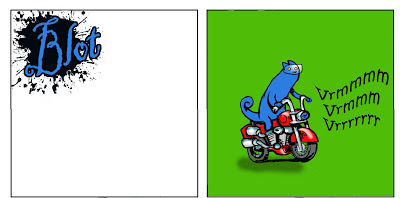
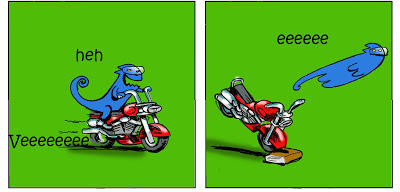
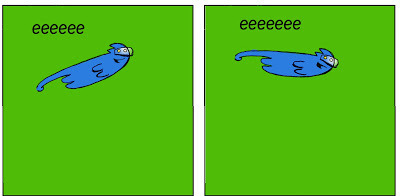
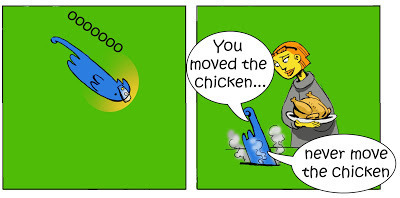
 driving course with the Institute of Advanced Motorists.
driving course with the Institute of Advanced Motorists.Some people I've mentioned this too seem to think I'm studying some kind of secret ninja driving, but it's nothing like that.
I'm studying the Highway Code again, and the book on Advanced Driving, which was written for drivers of emergency vehicles (so it tells you to concentrate on what's happening around you now, and not to think about 'the incident you're attending'.) I watch these videos by Chris Gilbert, and every Sunday I go out for an 'observed drive' with my mentor, a retired ambulance driver. He gives his time for nothing, and stresses that he is not a driving instructor. I am in complete control of the car at all times, and responsible for it, and he is there only to observe how I drive and offer tips on how I might improve.
Most of what is taught by the Advanced Drivers (many of whom prefer to call themselves 'Aware Drivers') is also taught to learner drivers by their instructors. It's already known by most drivers, and used by them most of the time, or, at least, some of the time. I own up to the fact that I'm refreshing skills rather than learning anything new - skills that I was taught, but forgot, or never completely mastered, or allowed to become sloppy.
I mean things like the proper way to hold the gear-stick in order to minimise the chance of going into the wrong gear: the position to take up on the road to allow you the greatest range of vision: the best gear to take at any particular speed or road position, to ease wear and tear on the car and save petrol.
What I'm learning is to apply this knowledge in a consistent, all-enveloping way - to change gear correctly every single time; to check mirrors immediately on observing every and any hazard, every time; to constantly observe what's developing in the distance, nearby and to the rear of my car.
It's quite Zen, in as much as it requires you to be 'in the moment' all the time. I can't allow my mind to drift off into plot construction or work on my 'To-Do List.' You can't do things by rote, or out of habit. Each use of the indicator has to be decided as a unique action, and not done automatically: is their any road-user who would benefit from the signal? If not, don't signal.
Straw on the road? Does that mean horses around the next bend, or a hay-wagon? A woman is pushing an empty push-chair? - Does that mean a toddler on the loose, about to dash out from behind parked cars? In fact, any parked cars have to be carefully observed and thought about as a possible hazard.
 Quick now, what were the last three road-signs you passed? And do they still apply?
Quick now, what were the last three road-signs you passed? And do they still apply?It turns driving into something like three-dimensional, mobile chess. What move is going to be made by that lorry three vehicles ahead? What will the cars near it do as a result?What are you going to do?
Part of the training is requiring you to give a running commentary as you drive - like Chris Gilbert in those videos. You have to tell your mentor, or examiner, what you're thinking, what you're doing, why you're taking a particular gear. You say, 'Mirror' as you check your mirror, and comment constantly on what drivers around you are doing (or may be planning to do.)
This may sound simple - I'll admit that I thought it would be a piece of cake until I tried it. It is, in fact, extraordinarily difficult - and I don't think it's just me. You can observe the hazards, know what you're going to do - your hand can already be moving to gear-stick or signal - but somehow, your mouth just cannot frame it into even simple words at the same time.
But it does concentrate the mind and force you to observe and think about what you're doing. In the four or five weeks since I've been doing the course, I think my driving has improved quite a bit.
A certain young man possibly escaped at least a trip to hospital because of it. I was proceeding in a westerly direction, driving along a minor urban road with many sharp bends and a 20 speed limit. The young man was walking on the pavement, his back to me, with music plugged into his ears. Without looking, and without any indication whatsoever of his intention, he stepped into the road directly in front of me. I honestly think that the only reason I didn't hit him was because I was practicing my 'Aware Driver' skills, was strictly observing the speed limit and playing driver-chess by considering any and all possibilities. (I had just mentioned him and his head-phones in my driver-commentary.) Because of that, I was able to brake sharply, and do no more harm to the lad than startle him out of his day-dream.
If this had happened three weeks previously? - I would have hit him. Not because I was a terrible driver then: the IAM assessed me as 'average to good' when I began this course. Not because I habitually drove down that road at high speed - it's not a road that enables high speed.
I would have hit him because his action in stepping out into the road was so unexpected and careless, and so close to my car, that had I been travelling at a slightly higher speed (which I would have been) and paying just a little less attention (which I would have been) then I would have hit him. And what a horrible, horrible experience that would have been for all concerned.
So that's me for the next while - talking to myself everywhere I drive, and repeatedly stopping to reverse round left-hand bends in an attempt to achieve the perfect kerb-hugging - but never kerb-mounting - sweep.I'm getting there. I plan to achieve 'good' for my left-hand reverse tomorrow morning.




Published on June 21, 2013 16:05
June 14, 2013
Black Country Ceilidh
This is becoming an occasional blog. Sometimes things just
 pile up and I can't find time - or energy - to write a blog too.
pile up and I can't find time - or energy - to write a blog too.
This week I went to a Black Country Ceilidh. It was a spur of the moment thing. Somebody had said there was 'a folk club' at The Plough Inn, near Stourbridge. "Want to try it?" Davy asked.
I was suspicious. "Is it real folk?"
Davy said, "What do you mean, 'real folk'?"
"Is it people putting a hand over one ear and singing about walking out one midsummer morning or leaving Liverpool?"
"I can see how you'd want to avoid that stuff," he said.
"No, that's the stuff I want. Will there be ballads about murder, and patricide, and infanticide and every other kind of -cide? And revenge. 'Cos that's my bag. I don't want country and western, or teenagers singing their own songs about how nobody loves 'em."
"I was just told," he said with a sigh. "that there's live folk-music of a Tuesday night. Do you want to give it a try?"
Cautiously, I agreed. And, folkies, it was great. There must have been about fifteen musicians there, who had just turned up for the fun of playing and singing music they loved. Some had brought two or three instruments. There was a double-bass, guitars, accordians, melodians, harmonicas, fiddles, bodhrans, mandolins...
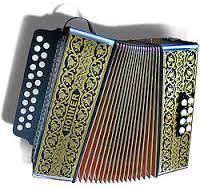 I got talking to Pat - Hi, Pat! - who had brought her accordian along. She was still learning, she told me, but came along to join in and practice. Pat was modest about her ability but, to me, who can't play or sing a note, all playing seems like some kind of magic - and I admired her for having the nerve to get out of the house and join in.
I got talking to Pat - Hi, Pat! - who had brought her accordian along. She was still learning, she told me, but came along to join in and practice. Pat was modest about her ability but, to me, who can't play or sing a note, all playing seems like some kind of magic - and I admired her for having the nerve to get out of the house and join in.
The leader of the group called on each member in turn, and asked if they wanted to play something. Nobody had to, but if they were willing, they named what they wanted to play, and led it, and the other musicians joined in. It was, in other words, a Black Country Ceilidh. Davy and I intend to tell another friend of ours, another Scot, who we are pretty sure will hurry over to The Plough with his guitar as soon as he can.
I thoroughly enjoyed it. There was a quick burst of early rock and roll, and another of Richard Thompson, but there was enough walking out on midsummer mornings to keep me happy. Though as I learned most of what I know about story-telling from the Border Ballads, I don't think there were enough battles or murders. Maybe next time. And the jigs, reels and shanties made up for it.
So if any of you are in the neighbourhood of Stourbridge and Wollaston, I recommend Tuesday night at The Plough.
The Plough Inn 154 Bridgnorth Rd, Stourbridge, West Midlands DY8 3PD 01384 393414
Images: Wikipedia commons.
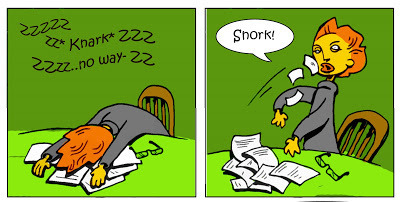
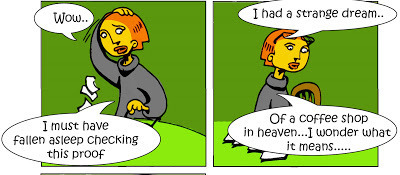
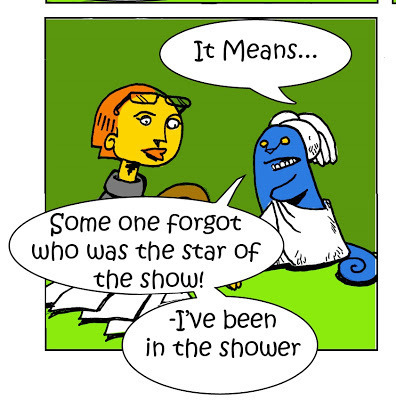
 pile up and I can't find time - or energy - to write a blog too.
pile up and I can't find time - or energy - to write a blog too.This week I went to a Black Country Ceilidh. It was a spur of the moment thing. Somebody had said there was 'a folk club' at The Plough Inn, near Stourbridge. "Want to try it?" Davy asked.
I was suspicious. "Is it real folk?"
Davy said, "What do you mean, 'real folk'?"
"Is it people putting a hand over one ear and singing about walking out one midsummer morning or leaving Liverpool?"
"I can see how you'd want to avoid that stuff," he said.
"No, that's the stuff I want. Will there be ballads about murder, and patricide, and infanticide and every other kind of -cide? And revenge. 'Cos that's my bag. I don't want country and western, or teenagers singing their own songs about how nobody loves 'em."
"I was just told," he said with a sigh. "that there's live folk-music of a Tuesday night. Do you want to give it a try?"
Cautiously, I agreed. And, folkies, it was great. There must have been about fifteen musicians there, who had just turned up for the fun of playing and singing music they loved. Some had brought two or three instruments. There was a double-bass, guitars, accordians, melodians, harmonicas, fiddles, bodhrans, mandolins...
 I got talking to Pat - Hi, Pat! - who had brought her accordian along. She was still learning, she told me, but came along to join in and practice. Pat was modest about her ability but, to me, who can't play or sing a note, all playing seems like some kind of magic - and I admired her for having the nerve to get out of the house and join in.
I got talking to Pat - Hi, Pat! - who had brought her accordian along. She was still learning, she told me, but came along to join in and practice. Pat was modest about her ability but, to me, who can't play or sing a note, all playing seems like some kind of magic - and I admired her for having the nerve to get out of the house and join in.The leader of the group called on each member in turn, and asked if they wanted to play something. Nobody had to, but if they were willing, they named what they wanted to play, and led it, and the other musicians joined in. It was, in other words, a Black Country Ceilidh. Davy and I intend to tell another friend of ours, another Scot, who we are pretty sure will hurry over to The Plough with his guitar as soon as he can.
I thoroughly enjoyed it. There was a quick burst of early rock and roll, and another of Richard Thompson, but there was enough walking out on midsummer mornings to keep me happy. Though as I learned most of what I know about story-telling from the Border Ballads, I don't think there were enough battles or murders. Maybe next time. And the jigs, reels and shanties made up for it.
So if any of you are in the neighbourhood of Stourbridge and Wollaston, I recommend Tuesday night at The Plough.
The Plough Inn 154 Bridgnorth Rd, Stourbridge, West Midlands DY8 3PD 01384 393414
Images: Wikipedia commons.



Published on June 14, 2013 16:05
May 31, 2013
Blue As Far As The Eye Can See

It's that time of the year again - though a bit late - when the bluebells burst out mob-handed and yomp all over the Clent Hills with cerulean yells.
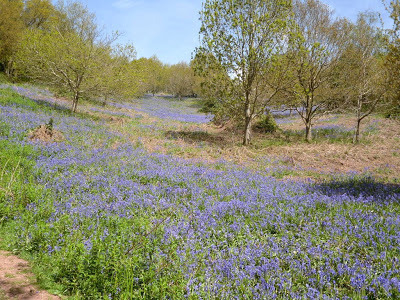
Streams and rivers of blue pour down the hillsides and pool in hollows.
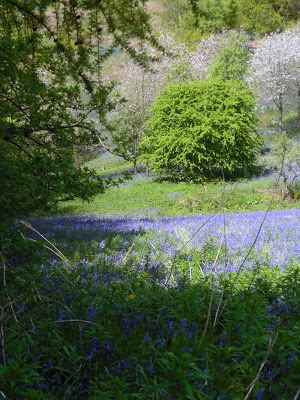
Whole hillsides are covered: sky-blue sunlight, indigo shadow.
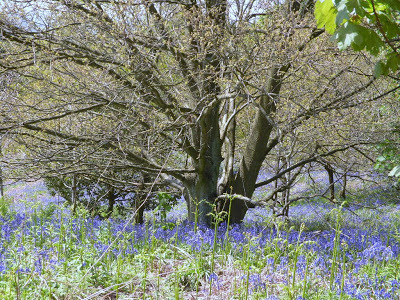
They mark 'undisturbed ancient woodland,' and in a couple of weeks they'll all be gone.
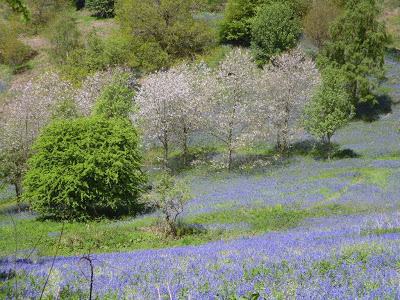
No photo can give you the gusts of wild hyacinth scent.
That's why you have to go and join them, and yell blue with them, while they're here.
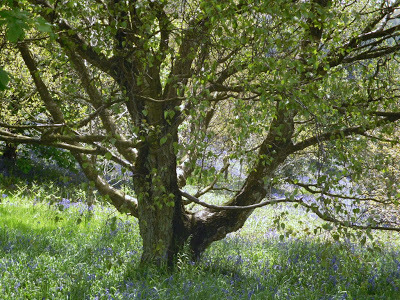
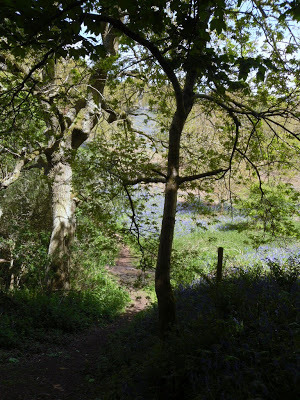
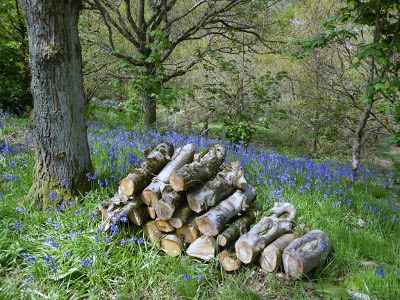
Published on May 31, 2013 16:05
May 24, 2013
In Conversation with Cally Phillips
Cally Phillips is someone with wide writing experience, and also the person with the brilliant idea of an Online E-book Festival - so I was keen to converse with her for this blog.
Sue: Cally, you worked in theatre and tv too. That’s something I’ve never done. What’s it like?
Cally: I really don’t like leaving work unfinished and working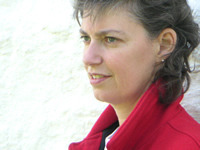 Cally Phillipsfor TV that's pretty much a given. When I made the decision to 'give up the day job' and write for a career (having discovered I personally just couldn't write and do a day job) TV seemed like the best bet to actually make a living from writing. In this country at least. And I did make a living out of it. Unfortunately, in TV you get paid a lot more often for scripts that never get made than you do for ones that do get made. And the meetings! I hate meetings. And meetings about meetings. Such a waste of time. You can spend three or more years working on a script before it gets produced. Or more likely it never gets produced. Irrespective of how good it is. And yet, when the chips were down, I had a script cleared from start to production in less than two months. (I was lucky, I came in as a stand-in when the budget was already agreed and the 'development' time had run out.) If I could always have done that it would have been great. Endless drafts because the money wasn't there to fully finance a project or because execs are trying to second guess the next big thing, wasn't for me. I was really aiming to write series drama but like so many 'be careful what you dream' things, when I actually got into it I realised I didn't like the 'cut and paste' style of writing as much as I wanted to have a good amount of creative control. In TV they pay you well because they really are buying your time, which becomes buying your life. An example. Producers and script editors (in my experience) have this knack of phoning you on a Friday, before a holiday or Xmas and needing you to make changes by Monday, day after New Year etc. When I realised this and just gave up taking weekends or holidays, it made life a bit easier, but it did strike me as a bit 'ornery'! I know that broadcasting is a 'business' first and foremost and when I decided I didn't want to engage with the set rules, I did the only other thing possible and walked away. I'm not whining. It was a pragmatic decision. That's the way the business works and if you don't like it, don't do it. No writer can change or influence the way broadcasting works. Writers (even through unions) just don't have that much sway in the industry. Becoming a producer would be another option but even then, it just takes so damned long to get anything done. It's a classic ‘jam tomorrow’ situation and for me it's much more important to be able to be actively creative on a day by day basis than have the promise of jam tomorrow.
Cally Phillipsfor TV that's pretty much a given. When I made the decision to 'give up the day job' and write for a career (having discovered I personally just couldn't write and do a day job) TV seemed like the best bet to actually make a living from writing. In this country at least. And I did make a living out of it. Unfortunately, in TV you get paid a lot more often for scripts that never get made than you do for ones that do get made. And the meetings! I hate meetings. And meetings about meetings. Such a waste of time. You can spend three or more years working on a script before it gets produced. Or more likely it never gets produced. Irrespective of how good it is. And yet, when the chips were down, I had a script cleared from start to production in less than two months. (I was lucky, I came in as a stand-in when the budget was already agreed and the 'development' time had run out.) If I could always have done that it would have been great. Endless drafts because the money wasn't there to fully finance a project or because execs are trying to second guess the next big thing, wasn't for me. I was really aiming to write series drama but like so many 'be careful what you dream' things, when I actually got into it I realised I didn't like the 'cut and paste' style of writing as much as I wanted to have a good amount of creative control. In TV they pay you well because they really are buying your time, which becomes buying your life. An example. Producers and script editors (in my experience) have this knack of phoning you on a Friday, before a holiday or Xmas and needing you to make changes by Monday, day after New Year etc. When I realised this and just gave up taking weekends or holidays, it made life a bit easier, but it did strike me as a bit 'ornery'! I know that broadcasting is a 'business' first and foremost and when I decided I didn't want to engage with the set rules, I did the only other thing possible and walked away. I'm not whining. It was a pragmatic decision. That's the way the business works and if you don't like it, don't do it. No writer can change or influence the way broadcasting works. Writers (even through unions) just don't have that much sway in the industry. Becoming a producer would be another option but even then, it just takes so damned long to get anything done. It's a classic ‘jam tomorrow’ situation and for me it's much more important to be able to be actively creative on a day by day basis than have the promise of jam tomorrow.
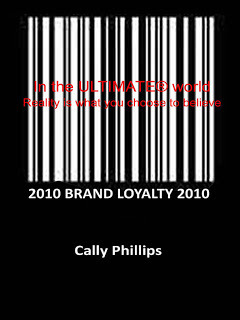 'Brand Loyalty' Sue: But you didn’t leave drama altogether – you went from TV to theatre, didn’t you?
'Brand Loyalty' Sue: But you didn’t leave drama altogether – you went from TV to theatre, didn’t you?
Cally: Luckily for me, as I was making this decision to leave TV I got the opportunity to do paid work as a dramatist in residence and theatre was a place I was much more comfortable in. I'd trained professionally as an actor before becoming a teacher. Ironically whereas in TV you get paid for not having work produced, in theatre you tend not to be paid even if you have work produced. And it's still hard to get mainstream work produced. I wrote my first play in 1990 and it took 3 years to get it put on. Eventually I had to produce and direct it myself. Critical acclaim but financial jeopardy. Still, it gave me confidence in my own work and the taste for just getting on and 'doing it' rather than waiting around for others to allow me to be creative. It took another 10 years before I was in the position to do that, but when it came, I grabbed it with both hands. Creatively I had a journey to make too. I love the discipline and structure of screenwriting. I love the immediacy and the particularities of writing for the stage. I love writing dialogue. I enjoy the complexity and layering of words and ideas which visual writing really requires. I like to be wholly creatively absorbed. But I moved away from mainstream theatre towards 'drama' because I wanted to see plays performed, not wait for the 'jam.' Whereas with screenworks, if they are produced they are 'there' as a legacy for all time (sometimes not a good thing) theatre is an ephemeral art and that's fine but more than that it can actually be a 'sharing' art form as well and in the 10 years I spent working actively in 'drama' I realised that I liked advocating other voices at least as much as writing my own 'voice'. Theatre (in its broadest sense and here I think the word ‘drama’ is much more appropriate) is something which people can share and not just as a passive audience. Boaltaught me that. And it ticked boxes for me by allowing me to direct as well, so that I could use all parts of my creativity, mental and physical, at the same time. I was lucky enough to get to work (and get paid) doing 'drama' in mental health and disability settings and from that I developed a creative style (and a business) using drama as advocacy. For a lot of the time I was working in a pre-literate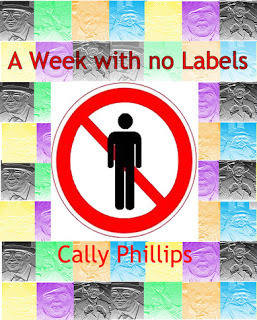 'A Week With No Labels' by Cally Phillipsculture. So the 'writing' was very, very flexible as a concept. But for me, the active involvement in drama and 'voicing' the unvoiced through writing was absolutely the best time of my creative life (so far). I would still be doing it but my health no longer permits me to. It's a pretty full on, intensive way of working and I just can't do that any longer. Since 'giving up' the active side of advocacy drama I've done a couple of things. Firstly I'm engaged in writing more 'traditional' things with an 'advocacy' flavour, using the skills and experience I gained during that creatively productive time. Secondly, I've been ebooking my back catalogue - which gives a kind of closure to the mountains of good work that all languished 'unfinished' because of financial or fashion constraints. I've got most of my playscripts out as ebooks now and I'm going to adapt a lot of my screenplays into fictional form. But I've got a bit diverted into publishing just lately and as a publisher I'm finding that I can enjoy voicing others at least as much as seeing or hearing my own voice in published form.
'A Week With No Labels' by Cally Phillipsculture. So the 'writing' was very, very flexible as a concept. But for me, the active involvement in drama and 'voicing' the unvoiced through writing was absolutely the best time of my creative life (so far). I would still be doing it but my health no longer permits me to. It's a pretty full on, intensive way of working and I just can't do that any longer. Since 'giving up' the active side of advocacy drama I've done a couple of things. Firstly I'm engaged in writing more 'traditional' things with an 'advocacy' flavour, using the skills and experience I gained during that creatively productive time. Secondly, I've been ebooking my back catalogue - which gives a kind of closure to the mountains of good work that all languished 'unfinished' because of financial or fashion constraints. I've got most of my playscripts out as ebooks now and I'm going to adapt a lot of my screenplays into fictional form. But I've got a bit diverted into publishing just lately and as a publisher I'm finding that I can enjoy voicing others at least as much as seeing or hearing my own voice in published form.
Sue: You’ve certainly worked in a lot of different media and forms! With all that experience, has your view of writing changed at all?
Cally: I started off wanting to influence the world through my writing. Twenty years on I'm not that interested in what I have to say any more. I've lost the ambition or illusion that I'm 'important' in that respect. And I'm no longer trying to 'find myself' through my writing. I'm a lot more interested in making sure other people have their say. And finding out about other people through writing. I've never really enjoyed being centre stage and I've learned that what I love most about writing is writing as a communicative shared experience. Which is possible in all mediums, but easier in some than others.
Sue: Thanks, Cally.Cally is a member of Authors Electric, who blog here, at Do Authors Dream of Electric Books?Cally’s books and plays can be found here, with links to her blogs. She’s always got something interesting to say!
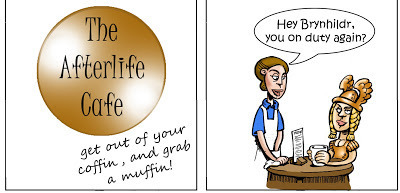
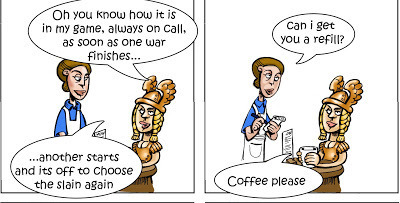
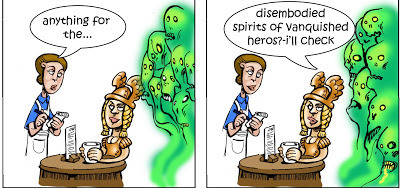
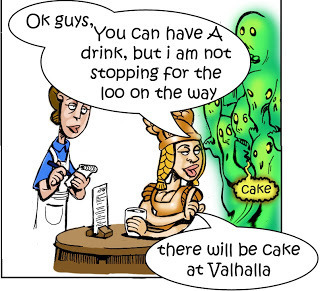
Sue: Cally, you worked in theatre and tv too. That’s something I’ve never done. What’s it like?
Cally: I really don’t like leaving work unfinished and working
 Cally Phillipsfor TV that's pretty much a given. When I made the decision to 'give up the day job' and write for a career (having discovered I personally just couldn't write and do a day job) TV seemed like the best bet to actually make a living from writing. In this country at least. And I did make a living out of it. Unfortunately, in TV you get paid a lot more often for scripts that never get made than you do for ones that do get made. And the meetings! I hate meetings. And meetings about meetings. Such a waste of time. You can spend three or more years working on a script before it gets produced. Or more likely it never gets produced. Irrespective of how good it is. And yet, when the chips were down, I had a script cleared from start to production in less than two months. (I was lucky, I came in as a stand-in when the budget was already agreed and the 'development' time had run out.) If I could always have done that it would have been great. Endless drafts because the money wasn't there to fully finance a project or because execs are trying to second guess the next big thing, wasn't for me. I was really aiming to write series drama but like so many 'be careful what you dream' things, when I actually got into it I realised I didn't like the 'cut and paste' style of writing as much as I wanted to have a good amount of creative control. In TV they pay you well because they really are buying your time, which becomes buying your life. An example. Producers and script editors (in my experience) have this knack of phoning you on a Friday, before a holiday or Xmas and needing you to make changes by Monday, day after New Year etc. When I realised this and just gave up taking weekends or holidays, it made life a bit easier, but it did strike me as a bit 'ornery'! I know that broadcasting is a 'business' first and foremost and when I decided I didn't want to engage with the set rules, I did the only other thing possible and walked away. I'm not whining. It was a pragmatic decision. That's the way the business works and if you don't like it, don't do it. No writer can change or influence the way broadcasting works. Writers (even through unions) just don't have that much sway in the industry. Becoming a producer would be another option but even then, it just takes so damned long to get anything done. It's a classic ‘jam tomorrow’ situation and for me it's much more important to be able to be actively creative on a day by day basis than have the promise of jam tomorrow.
Cally Phillipsfor TV that's pretty much a given. When I made the decision to 'give up the day job' and write for a career (having discovered I personally just couldn't write and do a day job) TV seemed like the best bet to actually make a living from writing. In this country at least. And I did make a living out of it. Unfortunately, in TV you get paid a lot more often for scripts that never get made than you do for ones that do get made. And the meetings! I hate meetings. And meetings about meetings. Such a waste of time. You can spend three or more years working on a script before it gets produced. Or more likely it never gets produced. Irrespective of how good it is. And yet, when the chips were down, I had a script cleared from start to production in less than two months. (I was lucky, I came in as a stand-in when the budget was already agreed and the 'development' time had run out.) If I could always have done that it would have been great. Endless drafts because the money wasn't there to fully finance a project or because execs are trying to second guess the next big thing, wasn't for me. I was really aiming to write series drama but like so many 'be careful what you dream' things, when I actually got into it I realised I didn't like the 'cut and paste' style of writing as much as I wanted to have a good amount of creative control. In TV they pay you well because they really are buying your time, which becomes buying your life. An example. Producers and script editors (in my experience) have this knack of phoning you on a Friday, before a holiday or Xmas and needing you to make changes by Monday, day after New Year etc. When I realised this and just gave up taking weekends or holidays, it made life a bit easier, but it did strike me as a bit 'ornery'! I know that broadcasting is a 'business' first and foremost and when I decided I didn't want to engage with the set rules, I did the only other thing possible and walked away. I'm not whining. It was a pragmatic decision. That's the way the business works and if you don't like it, don't do it. No writer can change or influence the way broadcasting works. Writers (even through unions) just don't have that much sway in the industry. Becoming a producer would be another option but even then, it just takes so damned long to get anything done. It's a classic ‘jam tomorrow’ situation and for me it's much more important to be able to be actively creative on a day by day basis than have the promise of jam tomorrow. 'Brand Loyalty' Sue: But you didn’t leave drama altogether – you went from TV to theatre, didn’t you?
'Brand Loyalty' Sue: But you didn’t leave drama altogether – you went from TV to theatre, didn’t you?Cally: Luckily for me, as I was making this decision to leave TV I got the opportunity to do paid work as a dramatist in residence and theatre was a place I was much more comfortable in. I'd trained professionally as an actor before becoming a teacher. Ironically whereas in TV you get paid for not having work produced, in theatre you tend not to be paid even if you have work produced. And it's still hard to get mainstream work produced. I wrote my first play in 1990 and it took 3 years to get it put on. Eventually I had to produce and direct it myself. Critical acclaim but financial jeopardy. Still, it gave me confidence in my own work and the taste for just getting on and 'doing it' rather than waiting around for others to allow me to be creative. It took another 10 years before I was in the position to do that, but when it came, I grabbed it with both hands. Creatively I had a journey to make too. I love the discipline and structure of screenwriting. I love the immediacy and the particularities of writing for the stage. I love writing dialogue. I enjoy the complexity and layering of words and ideas which visual writing really requires. I like to be wholly creatively absorbed. But I moved away from mainstream theatre towards 'drama' because I wanted to see plays performed, not wait for the 'jam.' Whereas with screenworks, if they are produced they are 'there' as a legacy for all time (sometimes not a good thing) theatre is an ephemeral art and that's fine but more than that it can actually be a 'sharing' art form as well and in the 10 years I spent working actively in 'drama' I realised that I liked advocating other voices at least as much as writing my own 'voice'. Theatre (in its broadest sense and here I think the word ‘drama’ is much more appropriate) is something which people can share and not just as a passive audience. Boaltaught me that. And it ticked boxes for me by allowing me to direct as well, so that I could use all parts of my creativity, mental and physical, at the same time. I was lucky enough to get to work (and get paid) doing 'drama' in mental health and disability settings and from that I developed a creative style (and a business) using drama as advocacy. For a lot of the time I was working in a pre-literate
 'A Week With No Labels' by Cally Phillipsculture. So the 'writing' was very, very flexible as a concept. But for me, the active involvement in drama and 'voicing' the unvoiced through writing was absolutely the best time of my creative life (so far). I would still be doing it but my health no longer permits me to. It's a pretty full on, intensive way of working and I just can't do that any longer. Since 'giving up' the active side of advocacy drama I've done a couple of things. Firstly I'm engaged in writing more 'traditional' things with an 'advocacy' flavour, using the skills and experience I gained during that creatively productive time. Secondly, I've been ebooking my back catalogue - which gives a kind of closure to the mountains of good work that all languished 'unfinished' because of financial or fashion constraints. I've got most of my playscripts out as ebooks now and I'm going to adapt a lot of my screenplays into fictional form. But I've got a bit diverted into publishing just lately and as a publisher I'm finding that I can enjoy voicing others at least as much as seeing or hearing my own voice in published form.
'A Week With No Labels' by Cally Phillipsculture. So the 'writing' was very, very flexible as a concept. But for me, the active involvement in drama and 'voicing' the unvoiced through writing was absolutely the best time of my creative life (so far). I would still be doing it but my health no longer permits me to. It's a pretty full on, intensive way of working and I just can't do that any longer. Since 'giving up' the active side of advocacy drama I've done a couple of things. Firstly I'm engaged in writing more 'traditional' things with an 'advocacy' flavour, using the skills and experience I gained during that creatively productive time. Secondly, I've been ebooking my back catalogue - which gives a kind of closure to the mountains of good work that all languished 'unfinished' because of financial or fashion constraints. I've got most of my playscripts out as ebooks now and I'm going to adapt a lot of my screenplays into fictional form. But I've got a bit diverted into publishing just lately and as a publisher I'm finding that I can enjoy voicing others at least as much as seeing or hearing my own voice in published form.Sue: You’ve certainly worked in a lot of different media and forms! With all that experience, has your view of writing changed at all?
Cally: I started off wanting to influence the world through my writing. Twenty years on I'm not that interested in what I have to say any more. I've lost the ambition or illusion that I'm 'important' in that respect. And I'm no longer trying to 'find myself' through my writing. I'm a lot more interested in making sure other people have their say. And finding out about other people through writing. I've never really enjoyed being centre stage and I've learned that what I love most about writing is writing as a communicative shared experience. Which is possible in all mediums, but easier in some than others.
Sue: Thanks, Cally.Cally is a member of Authors Electric, who blog here, at Do Authors Dream of Electric Books?Cally’s books and plays can be found here, with links to her blogs. She’s always got something interesting to say!




Published on May 24, 2013 16:05
May 17, 2013
Navigating the rewritten rewrites...
There are tides in the affairs of blogs, and the tide for this one
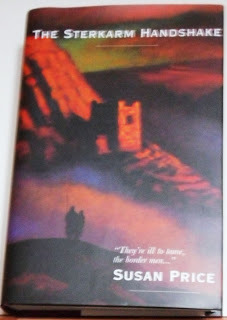 The Sterkarm Handshakehas been far out for a couple of weeks.
The Sterkarm Handshakehas been far out for a couple of weeks.
Partly I've been very busy with selling my late parents' house, clearing it of all their stuff, and redistributing heirlooms. I've made so many trip to the local dump that the blokes down there - a very friendly, helpful lot - have given me my own parking space and put me on their Christmas card list.
But somewhere in all this, I actually finished Sterkarm 3. Again.
I was rewriting it because my agent wanted me to make a clearer distinction between the two - yes, count 'em - two gangs of Sterkarms. "We only have one bite at this cherry," she said. "I don't want to offer it until it's right."
To help me keep track of 147,000 words, I've used Word's 'navigation pane', which is immensely useful. If you've never used it, it's a quick, simply way of putting a hyperlink into a file. A side-panel, or pane, opens down the left-hand side of the screen. When I highlighted a chapter heading, and then clicked on 'Heading 1', that heading appeared in the side-panel.
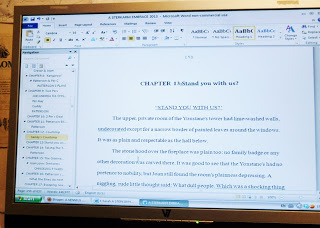 If I wanted to be able to find a particular scene, I gave it a sub-heading, highlighted it and clicked 'Heading 2'. It then appeared in the side-panel under the chapter heading, but in less heavy type, and inset - so I could easily see the difference between the start of a chapter, and the beginning of scenes within it.
If I wanted to be able to find a particular scene, I gave it a sub-heading, highlighted it and clicked 'Heading 2'. It then appeared in the side-panel under the chapter heading, but in less heavy type, and inset - so I could easily see the difference between the start of a chapter, and the beginning of scenes within it.
As the words, and 50-odd chapter mounted up, so the chapter headings and subheading appeared down the left-hand side.
If I was suddenly reminded, as I worked on chapter 47, of some detail I should have added to chapter 9, then all I had to do was click on the heading 'Chapter 9' in the side-panel, and the hyperlink would jump me straight back there. If I knew the scene I wanted, I could jump straight to that scene. It's made rewriting a hell of a lot easier.
But only so far. This must be the fourth or fifth rewrite. I thought I would be nipping through and doing nothing more than knocking out the sub-headings, to make a nice, tidy typescript for my agent to read. Instead I've been reading passages and thinking, 'Why on earth did I write that? How can I ever have thought that made sense? Or was good enough?'
And so I'm cutting - slashing, sometimes - and changing and re-ordering. But I am intent on finishing this spruce-up in as short a time as possible, and will then email it to my agent. I promise.
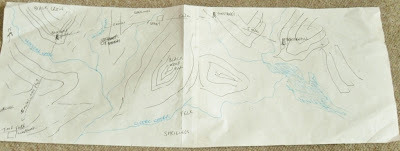 My sketch map of Sterkarm country, made of two pieces of scrap paper taped together and scribbled on.
My sketch map of Sterkarm country, made of two pieces of scrap paper taped together and scribbled on.
And this is where Blott has gone. He's out the back somewhere, chasing paranormal rodents round the bins.
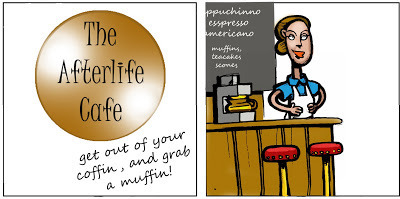
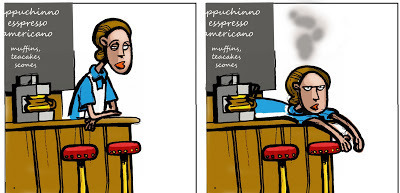
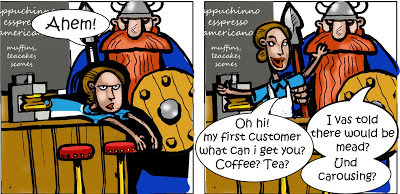
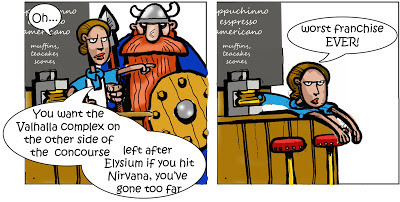
 The Sterkarm Handshakehas been far out for a couple of weeks.
The Sterkarm Handshakehas been far out for a couple of weeks.Partly I've been very busy with selling my late parents' house, clearing it of all their stuff, and redistributing heirlooms. I've made so many trip to the local dump that the blokes down there - a very friendly, helpful lot - have given me my own parking space and put me on their Christmas card list.
But somewhere in all this, I actually finished Sterkarm 3. Again.
I was rewriting it because my agent wanted me to make a clearer distinction between the two - yes, count 'em - two gangs of Sterkarms. "We only have one bite at this cherry," she said. "I don't want to offer it until it's right."
To help me keep track of 147,000 words, I've used Word's 'navigation pane', which is immensely useful. If you've never used it, it's a quick, simply way of putting a hyperlink into a file. A side-panel, or pane, opens down the left-hand side of the screen. When I highlighted a chapter heading, and then clicked on 'Heading 1', that heading appeared in the side-panel.
 If I wanted to be able to find a particular scene, I gave it a sub-heading, highlighted it and clicked 'Heading 2'. It then appeared in the side-panel under the chapter heading, but in less heavy type, and inset - so I could easily see the difference between the start of a chapter, and the beginning of scenes within it.
If I wanted to be able to find a particular scene, I gave it a sub-heading, highlighted it and clicked 'Heading 2'. It then appeared in the side-panel under the chapter heading, but in less heavy type, and inset - so I could easily see the difference between the start of a chapter, and the beginning of scenes within it.As the words, and 50-odd chapter mounted up, so the chapter headings and subheading appeared down the left-hand side.
If I was suddenly reminded, as I worked on chapter 47, of some detail I should have added to chapter 9, then all I had to do was click on the heading 'Chapter 9' in the side-panel, and the hyperlink would jump me straight back there. If I knew the scene I wanted, I could jump straight to that scene. It's made rewriting a hell of a lot easier.
But only so far. This must be the fourth or fifth rewrite. I thought I would be nipping through and doing nothing more than knocking out the sub-headings, to make a nice, tidy typescript for my agent to read. Instead I've been reading passages and thinking, 'Why on earth did I write that? How can I ever have thought that made sense? Or was good enough?'
And so I'm cutting - slashing, sometimes - and changing and re-ordering. But I am intent on finishing this spruce-up in as short a time as possible, and will then email it to my agent. I promise.
 My sketch map of Sterkarm country, made of two pieces of scrap paper taped together and scribbled on.
My sketch map of Sterkarm country, made of two pieces of scrap paper taped together and scribbled on.And this is where Blott has gone. He's out the back somewhere, chasing paranormal rodents round the bins.




Published on May 17, 2013 16:05
April 26, 2013
Another Old (Book) Friend
Does anybody else have this book? Has anyone ever heard of
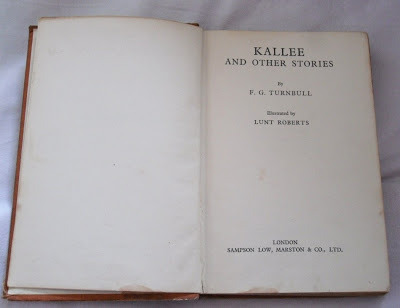 it? 'Kallee and Other Stories' by F. G. Turnbull, and illustrated rather beautifully by Lunt Roberts. (An unfortunate name, but beautiful drawings.)
it? 'Kallee and Other Stories' by F. G. Turnbull, and illustrated rather beautifully by Lunt Roberts. (An unfortunate name, but beautiful drawings.)
I ask because I've just found this old friend during the great turning out of my parents' house before selling it. I seized it with a cry of rage at having found it in a box intended to be given away to charity, and carried it away to the safety of my own overcrowded bookcases.
'Kallee' was a great favourite of my Dad's, became a favourite of mine almost in infancy, and yet I've never seen it mentioned anywhere, or heard of the writer in any other context.
I searched on Google, and found out nothing.
The publisher is given as 'London, Sampson Low, Marston & Co, Ltd.' I've just a Google search on this firm, and came on this rather interesting site.
The book itself came be found on sale online, for £14 or $21, used, but not a word about the author, or any reviews.
My copy doesn't give much away. The copyright page is blank, except for this: 'This book is produced in complete conformity with the Authorised Economy Standards. Made and printed in Great Britain by Purnell and Sons, Ltd., Paulton (Somerset) and London.'
My Dad loved it because all the stories are about animals and birds, and he loved them. He began reading me the stories when I was quite small - certainly not much older than seven. He used to read me a story and then put the book away in the bookcase. I would sneak it out, feeling I was doing something very daring in filching one of my Dad's books, and read it for myself. (And I can hear a yodelling from Switzerland as I write this. If you're curious as to why, here's a blog I made earlier, that will explain.
This is how the title story, KALLEE, begins:
I know I used to guess at the meaning of a lot of words, and also that, if completely defeated, I used to trail off to the nearest of my parents and ask them, 'What does this mean?' Once they'd explained, I'd take the book away again and continue reading. (Calm down, Switzerland!)
You can tell that I loved the book, because inside the front cover I've drawn this. The '77' in the shield refers to the number of
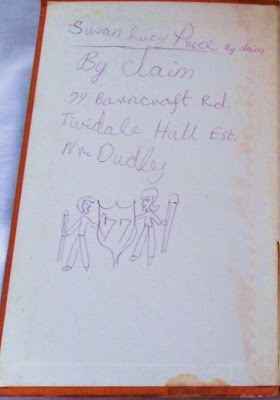 our house. It says: 'Susan Lucy Price By Claim' - so I was laying claim to this book, even though it belonged to my Dad. And if I find out who put it in that charity bag...
our house. It says: 'Susan Lucy Price By Claim' - so I was laying claim to this book, even though it belonged to my Dad. And if I find out who put it in that charity bag...
My Dad often read me the story 'Grumphie' which is about three boys entering their pet pig into a competition. Grumphie has a straight tail, and therefore has no chance of winning - but as they're trying to spruce him up, he eats the cake of perfumed soap they're washing him with - and his tail curls! So now they know how to win. 'Wullie; bolt oot an' get a cake o' scented soap.' All the stories are set in Scotland: I wonder if that has anything to do with my tendency to head north whenever possible?
Dad was probably trying to find the lighter, funnier stories, as being more suitable to my age - but when I started reading them for myself, the harsher stories quickly became my favourites. I particularly loved 'Crossed Trails'. This tells of a fox and a stag. The fox, as a cub, is charged and trampled by the stag, and his hind-leg shattered. The story tells how the lame fox grows up and struggles to survive in a hard Highland winter. During a blizzard, the fox and stag find themselves on the same trail, struggling through heavy snow and strong winds. The fox cringes away whenever he glimpses the stag - what he doesn't realise is that the stag is terrified of the fox on his trail. The stag races away in panic, falls into a
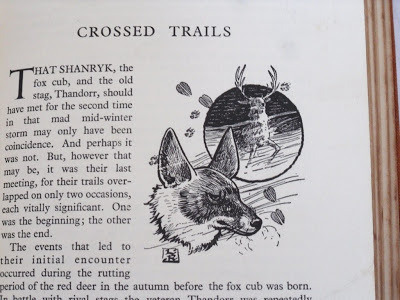 crevasse and is killed. Shortly afterwards, the snow-blinded fox falls into the same hole - and finds himself lying on top of all the food he'll need to survive the winter.
crevasse and is killed. Shortly afterwards, the snow-blinded fox falls into the same hole - and finds himself lying on top of all the food he'll need to survive the winter.
Another great favourite was 'The Rebel of Glenlee.' This tells of, as Monty Python might have put it, 'that most dangerous of all things, an intelligent, rebellious sheep.' She's a trial to her owners, is Birkie, the black-faced ewe. She was a spoilt, pet lamb, but felt herself thrown out of paradise when she was demoted to a mere sheep, and from that day hated all men and collies. She charges the dogs, refuses to return quietly to the home meadows, and leads the other sheep astray.
But she redeems herself one terrible winter, when the flock is lost in the deep snow. Birkie is harried by a fox, but deals with it as she does with collies. Then, as she struggles in deep snow, ravens blind her. In such dire trouble, Birkie starts to hanker for the safety of home, and makes tracks for it, regardless of any obstacles in her way. She happens on the rest of the flock, and they follow her. She guides them all home - and becomes the farmer's pet once again.
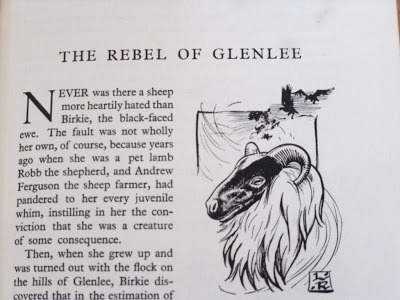
How I loved this book! I'm going to enjoy reading it again. My guess is that the stories originally appeared in a newspaper or magazine, as they're all the same length. But I really know nothing about F G Turnbull at all. Do the initials, perhaps, disguise a woman writer?
Does anybody out there know anything more, about writer or artist?
And for those of you wondering where Blott has wandered off to...
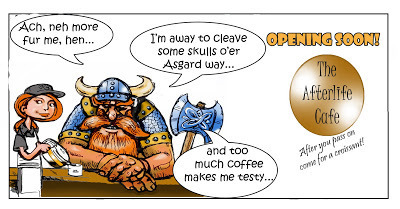
 it? 'Kallee and Other Stories' by F. G. Turnbull, and illustrated rather beautifully by Lunt Roberts. (An unfortunate name, but beautiful drawings.)
it? 'Kallee and Other Stories' by F. G. Turnbull, and illustrated rather beautifully by Lunt Roberts. (An unfortunate name, but beautiful drawings.)I ask because I've just found this old friend during the great turning out of my parents' house before selling it. I seized it with a cry of rage at having found it in a box intended to be given away to charity, and carried it away to the safety of my own overcrowded bookcases.
'Kallee' was a great favourite of my Dad's, became a favourite of mine almost in infancy, and yet I've never seen it mentioned anywhere, or heard of the writer in any other context.
I searched on Google, and found out nothing.
The publisher is given as 'London, Sampson Low, Marston & Co, Ltd.' I've just a Google search on this firm, and came on this rather interesting site.
The book itself came be found on sale online, for £14 or $21, used, but not a word about the author, or any reviews.
My copy doesn't give much away. The copyright page is blank, except for this: 'This book is produced in complete conformity with the Authorised Economy Standards. Made and printed in Great Britain by Purnell and Sons, Ltd., Paulton (Somerset) and London.'
My Dad loved it because all the stories are about animals and birds, and he loved them. He began reading me the stories when I was quite small - certainly not much older than seven. He used to read me a story and then put the book away in the bookcase. I would sneak it out, feeling I was doing something very daring in filching one of my Dad's books, and read it for myself. (And I can hear a yodelling from Switzerland as I write this. If you're curious as to why, here's a blog I made earlier, that will explain.
This is how the title story, KALLEE, begins:
I will never shoot a partridge again; that is a vow I have sworn. I still hope to use my gun through many years to come; but when the coveys rise before me in root or stubble field hereafter, I will keep my weapon at 'trail' and let them go. My spaniel, Roy, will gaze at me, with wonder in his dear old eyes, but he will soon understand that the brown birds are not our game - now that we have known Kallee, that great cock partridge.They're not really children's stories, as you can see; and yet, over several years, I read them all, returning to the book again and again. Looking through them now, I wonder how I coped with the Scots dialect of the keepers, and with phrases such as, 'As the stoat continued to haunt the field day after day...' Did I think the story meant the ghost of a stoat?
I know I used to guess at the meaning of a lot of words, and also that, if completely defeated, I used to trail off to the nearest of my parents and ask them, 'What does this mean?' Once they'd explained, I'd take the book away again and continue reading. (Calm down, Switzerland!)
You can tell that I loved the book, because inside the front cover I've drawn this. The '77' in the shield refers to the number of
 our house. It says: 'Susan Lucy Price By Claim' - so I was laying claim to this book, even though it belonged to my Dad. And if I find out who put it in that charity bag...
our house. It says: 'Susan Lucy Price By Claim' - so I was laying claim to this book, even though it belonged to my Dad. And if I find out who put it in that charity bag... My Dad often read me the story 'Grumphie' which is about three boys entering their pet pig into a competition. Grumphie has a straight tail, and therefore has no chance of winning - but as they're trying to spruce him up, he eats the cake of perfumed soap they're washing him with - and his tail curls! So now they know how to win. 'Wullie; bolt oot an' get a cake o' scented soap.' All the stories are set in Scotland: I wonder if that has anything to do with my tendency to head north whenever possible?
Dad was probably trying to find the lighter, funnier stories, as being more suitable to my age - but when I started reading them for myself, the harsher stories quickly became my favourites. I particularly loved 'Crossed Trails'. This tells of a fox and a stag. The fox, as a cub, is charged and trampled by the stag, and his hind-leg shattered. The story tells how the lame fox grows up and struggles to survive in a hard Highland winter. During a blizzard, the fox and stag find themselves on the same trail, struggling through heavy snow and strong winds. The fox cringes away whenever he glimpses the stag - what he doesn't realise is that the stag is terrified of the fox on his trail. The stag races away in panic, falls into a
 crevasse and is killed. Shortly afterwards, the snow-blinded fox falls into the same hole - and finds himself lying on top of all the food he'll need to survive the winter.
crevasse and is killed. Shortly afterwards, the snow-blinded fox falls into the same hole - and finds himself lying on top of all the food he'll need to survive the winter.Another great favourite was 'The Rebel of Glenlee.' This tells of, as Monty Python might have put it, 'that most dangerous of all things, an intelligent, rebellious sheep.' She's a trial to her owners, is Birkie, the black-faced ewe. She was a spoilt, pet lamb, but felt herself thrown out of paradise when she was demoted to a mere sheep, and from that day hated all men and collies. She charges the dogs, refuses to return quietly to the home meadows, and leads the other sheep astray.
But she redeems herself one terrible winter, when the flock is lost in the deep snow. Birkie is harried by a fox, but deals with it as she does with collies. Then, as she struggles in deep snow, ravens blind her. In such dire trouble, Birkie starts to hanker for the safety of home, and makes tracks for it, regardless of any obstacles in her way. She happens on the rest of the flock, and they follow her. She guides them all home - and becomes the farmer's pet once again.

How I loved this book! I'm going to enjoy reading it again. My guess is that the stories originally appeared in a newspaper or magazine, as they're all the same length. But I really know nothing about F G Turnbull at all. Do the initials, perhaps, disguise a woman writer?
Does anybody out there know anything more, about writer or artist?
And for those of you wondering where Blott has wandered off to...

Published on April 26, 2013 16:05
April 19, 2013
A Post Funereal
A friend of mine was recently at a funeral. Fortunately, he
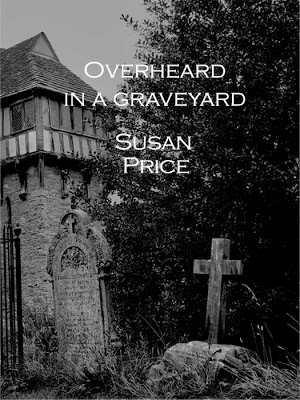 'Overheard In A Graveyard'wasn't one of the bereaved. He was kindly giving a lift to some neighbours of his who had been friends of the deceased. The opinion of most present, my friend said, reported, was that the whole funeral had been something of an insult to all concerned, alive and dead.
'Overheard In A Graveyard'wasn't one of the bereaved. He was kindly giving a lift to some neighbours of his who had been friends of the deceased. The opinion of most present, my friend said, reported, was that the whole funeral had been something of an insult to all concerned, alive and dead.
There was an expensive coffin, a hearse and several funeral cars. There were floral tributes, and a chapel had been hired. There was a service which, my friend said, was embarrassing. The priest obviously had no idea who the person in the coffin had been, and spoke in the most general platitudes. The only thing of interest was the race between the priest and the organist, to see who get through the thing fastest. The speed with which they took corners was quite exhilarating.
It would have been much more satisfying all round, said my friend - a Christian, as it happens - if they hadn't bothered with a funeral at all but, instead, everyone had gone down the local pub, (a great favourite of the deceased), had eaten a meal together, had a few drinks, and just talked.
This account pretty much describes every funeral I've ever attended. I'm always left wondering, 'Why did we bother with that?' Whatever it is we hope to get from a funeral, none of them, in my experience, actually provide it - and yet they are very expensive. The money could be better spent.
Why pay for the coffin, the hearse, the cars, the flowers, the chapel, the service, take days off work, find baby-sitters and so on, when it leaves most of the attendees feeling cheated?
Well, people feel it's expected of them. They fear they'll be accused of being monetary, and that neighbours and in-laws will think they didn't care for the dead person unless they hold a funeral.
Personally, at family funerals, I've felt almost the opposite - that this meaningless nod to convention didn't begin to express what I felt about the person who'd died - that it was an irrelevance, a distraction, even an interruption to my grieving.
I have this idea - which I will get around to doing something about one day, honest - that I will arrange and pay for my own funeral while I'm still here. I will say to the undertaker, "All I want you to do is collect the beef from wherever it is, cart it to the nearest crem, and dispose of it legally. No coffin, no hearse, no service, no chapel, no urn, no flowers, no nothing that isn't legally required, or absolutely necessary to move the corpse from one place to another." If anyone surviving me wants to mark my leaving, they can get together down the pub, or at one of their homes, have a meal and a few drinks, and talk. The bill will be much smaller than that for the average funeral, and the experience much more satisfying.
I apologise to any of my close relatives who may be reading, and may think otherwise, but I honestly wish that's what we'd done when my parents died. Neither of them had ever hankered after 'a good send off.' Indeed, my mother often told us, "Send me flowers when I'm alive and can enjoy them. When I die, put me in a black plastic bin-bag and chuck me in the cut."
I wish we'd obeyed her - or, as near as the law would have allowed. And then have gathered together somewhere, with a few drinks, and told stories of them, and retold the stories they told us. That would have celebrated my parents and marked their passing in a way that would have gone far beyond the empty ritual that we did endure. I didn't say so, because I didn't think it was the time to have that discussion - my father had just lost his wife, and my sibs had lost their father.
Of course, my family were, and are, all godless atheists, and might be expected to say things like that - but my friend is a Christian, and he feels just the same about funerals.
I know this is a sensitive area, and I am not suggesting, at all, that everyone should think as I do. I'm only saying that 'the funeral' is such a strong convention that people are a little shy of defying it, and perhaps people should feel less bound by the idea that they have to go along with it, even when they find the whole performance hollow, even annoying.
I'd be interested to know what others think. Do you find the conventional funeral comforting or helpful?
 'Overheard In A Graveyard'wasn't one of the bereaved. He was kindly giving a lift to some neighbours of his who had been friends of the deceased. The opinion of most present, my friend said, reported, was that the whole funeral had been something of an insult to all concerned, alive and dead.
'Overheard In A Graveyard'wasn't one of the bereaved. He was kindly giving a lift to some neighbours of his who had been friends of the deceased. The opinion of most present, my friend said, reported, was that the whole funeral had been something of an insult to all concerned, alive and dead.There was an expensive coffin, a hearse and several funeral cars. There were floral tributes, and a chapel had been hired. There was a service which, my friend said, was embarrassing. The priest obviously had no idea who the person in the coffin had been, and spoke in the most general platitudes. The only thing of interest was the race between the priest and the organist, to see who get through the thing fastest. The speed with which they took corners was quite exhilarating.
It would have been much more satisfying all round, said my friend - a Christian, as it happens - if they hadn't bothered with a funeral at all but, instead, everyone had gone down the local pub, (a great favourite of the deceased), had eaten a meal together, had a few drinks, and just talked.
This account pretty much describes every funeral I've ever attended. I'm always left wondering, 'Why did we bother with that?' Whatever it is we hope to get from a funeral, none of them, in my experience, actually provide it - and yet they are very expensive. The money could be better spent.
Why pay for the coffin, the hearse, the cars, the flowers, the chapel, the service, take days off work, find baby-sitters and so on, when it leaves most of the attendees feeling cheated?
Well, people feel it's expected of them. They fear they'll be accused of being monetary, and that neighbours and in-laws will think they didn't care for the dead person unless they hold a funeral.
Personally, at family funerals, I've felt almost the opposite - that this meaningless nod to convention didn't begin to express what I felt about the person who'd died - that it was an irrelevance, a distraction, even an interruption to my grieving.
I have this idea - which I will get around to doing something about one day, honest - that I will arrange and pay for my own funeral while I'm still here. I will say to the undertaker, "All I want you to do is collect the beef from wherever it is, cart it to the nearest crem, and dispose of it legally. No coffin, no hearse, no service, no chapel, no urn, no flowers, no nothing that isn't legally required, or absolutely necessary to move the corpse from one place to another." If anyone surviving me wants to mark my leaving, they can get together down the pub, or at one of their homes, have a meal and a few drinks, and talk. The bill will be much smaller than that for the average funeral, and the experience much more satisfying.
I apologise to any of my close relatives who may be reading, and may think otherwise, but I honestly wish that's what we'd done when my parents died. Neither of them had ever hankered after 'a good send off.' Indeed, my mother often told us, "Send me flowers when I'm alive and can enjoy them. When I die, put me in a black plastic bin-bag and chuck me in the cut."
I wish we'd obeyed her - or, as near as the law would have allowed. And then have gathered together somewhere, with a few drinks, and told stories of them, and retold the stories they told us. That would have celebrated my parents and marked their passing in a way that would have gone far beyond the empty ritual that we did endure. I didn't say so, because I didn't think it was the time to have that discussion - my father had just lost his wife, and my sibs had lost their father.
Of course, my family were, and are, all godless atheists, and might be expected to say things like that - but my friend is a Christian, and he feels just the same about funerals.
I know this is a sensitive area, and I am not suggesting, at all, that everyone should think as I do. I'm only saying that 'the funeral' is such a strong convention that people are a little shy of defying it, and perhaps people should feel less bound by the idea that they have to go along with it, even when they find the whole performance hollow, even annoying.
I'd be interested to know what others think. Do you find the conventional funeral comforting or helpful?
Published on April 19, 2013 16:05
April 12, 2013
PERIOD PIECE by Gwen Raverat
I've been sorting out my book-shelves recently and - horror -
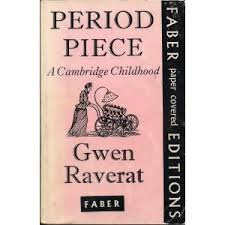 'Period Piece, Gwen Raveratthrowing some away. Part of this job, of course, is sitting down on the floor with a book you've just rediscovered, and reading it for three hours, while others step over you. One rediscovered book, which distracted me for more than three hours, was PERIOD PIECE: A CAMBRIDGE CHILDHOOD, by Gwen Raverat, my copy of which is an old Faber paperback from the 1960s, pale pink, with a black stripe down the opening edge. Its original price was '6s 6d, net.'
'Period Piece, Gwen Raveratthrowing some away. Part of this job, of course, is sitting down on the floor with a book you've just rediscovered, and reading it for three hours, while others step over you. One rediscovered book, which distracted me for more than three hours, was PERIOD PIECE: A CAMBRIDGE CHILDHOOD, by Gwen Raverat, my copy of which is an old Faber paperback from the 1960s, pale pink, with a black stripe down the opening edge. Its original price was '6s 6d, net.' 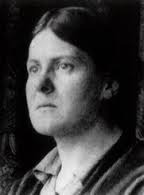 Gwen Raverat Now Gwen Raverat was one of Charles Darwin's granddaughters, (though he died before she was born.) The eccentric Darwin family certainly gave her plenty of material, but it's not the Darwin gossip, nor even the vivid, child's-eye view of life in a wealthy family of the late nineteeth and early twentieth centuries that make this book a treasure. The book's immense charm, which doesn't diminish with re-reading (even when sitting cross-legged on the floor in front of a bookcase), is entirely due to the personality of its writer. Reading the book is like visiting a much-loved friend, and listening to her tell stories of her childhood with warmth, affection, perception, great humour, and even, yes, wisdom. And just as, if you're lucky enough to have a friend like that, you go back again and again, so you return to this book.
Gwen Raverat Now Gwen Raverat was one of Charles Darwin's granddaughters, (though he died before she was born.) The eccentric Darwin family certainly gave her plenty of material, but it's not the Darwin gossip, nor even the vivid, child's-eye view of life in a wealthy family of the late nineteeth and early twentieth centuries that make this book a treasure. The book's immense charm, which doesn't diminish with re-reading (even when sitting cross-legged on the floor in front of a bookcase), is entirely due to the personality of its writer. Reading the book is like visiting a much-loved friend, and listening to her tell stories of her childhood with warmth, affection, perception, great humour, and even, yes, wisdom. And just as, if you're lucky enough to have a friend like that, you go back again and again, so you return to this book. 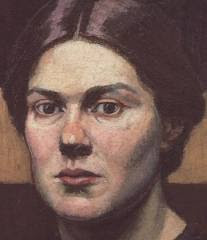 Gwen Raverat: self-portrait As Raverat says herself, in her preface, '..it does not matter which chapter is read first or last.' Some chapter titles are: Theories, Propriety, Aunt Etty, Ghosts and Horrors, Religion...I find it hard to choose a favourite.
Gwen Raverat: self-portrait As Raverat says herself, in her preface, '..it does not matter which chapter is read first or last.' Some chapter titles are: Theories, Propriety, Aunt Etty, Ghosts and Horrors, Religion...I find it hard to choose a favourite. 'Theories' is not about anything like the Theory of Evolution, but her mother's theories about how children should be raised : 'Iwas...born into the trying position of being the eldest of the family, so that the full force of my mother's theories about education were brought to bear upon me; and it fell to me to blaze a path to freedom for my juniors, through the forest of her good intentions.' As an eldest child - though from quite a different kind of family - I can identify with that.
For those who may have theories and children of their own, Raverat has these soothing words: 'Dear Reader, you may take it from me, that however hard you try – or don't try; whatever you do – or don't do; for better, for worse; for richer, for poorer; every way and every day:
THE PARENT IS ALWAYS WRONG.
So it is no good bothering about it. When the little pests grow up they will certainly tell you exactly what you did wrong in their case. But never mind; they will be just as wrong themselves in their turn. So take things easily; and above all, eschew good intentions .'
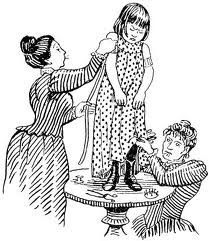 Illustration: Gwen Raverat
Illustration: Gwen Raverat
In 'Propriety' she dissects the odd notions of good behaviour which held sway during her childhood, and which she seems to have found odd even then; and tells us of some things which actually did shock her. '...I once saw, through the banisters at Down, one of my Darwin uncles give a friendly conjugal kiss to... his wife. I rushed away in absolute horror from this unprecedented orgy... And then there was 'Charley's Aunt'. This was the first real play we ever saw. It did not seem to me at all funny, only tremendous and exciting and, at one point, most dangerously improper... [One] of the young men dressed up as Charley's Aunt, and ran across the stage, lifting up his petticoats, and showing his trousers underneath. Nothing since then has ever shocked me so much.'
The chapter on Aunt Etty was, I think, worth the 6s 6d alone, and Aunt Etty in full cry after the stinkhorns has made me laugh out loud, as has the short, illustrated passage on 'The Habitat of the British Tiger', and its sad suffering from 'canopy cramp'. (The tiger is shown lurking on top of a bed's tiny canopy, the better to eat the child within the bed.) The tiger comes in another chapter, Ghosts and Horrors, some of which is genuinely disturbing.
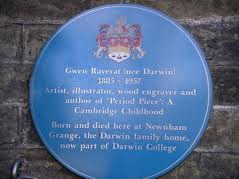 'Religion' opens, 'The first religious experience I can remember is getting under the nursery table to pray that the dancing class mistress might be dead before we got to Dancing Class.' A little later she describes God for us:
'[He] had a smooth oval face, with no hair and no beard and no ears. I imagine that He was not descended, as most Gods are, from Father Christmas, but rather from the Sun Insurance Office sign. Even now this hairless, earless, eggshaped face... gives me a sort of holy feeling in my stomach.'
'Religion' opens, 'The first religious experience I can remember is getting under the nursery table to pray that the dancing class mistress might be dead before we got to Dancing Class.' A little later she describes God for us:
'[He] had a smooth oval face, with no hair and no beard and no ears. I imagine that He was not descended, as most Gods are, from Father Christmas, but rather from the Sun Insurance Office sign. Even now this hairless, earless, eggshaped face... gives me a sort of holy feeling in my stomach.'
It's a hard book to sum up. It's a lively, vivid memoir of a particular time and place, and a wonderful recreation of the way a child sees and thinks about the world. Since Raverat ends the book as a young woman, it could be called 'a coming of age story.' She closes the book with the words: 'When I look back on those years when I was neither fish nor flesh, between the ages of sixteen and twenty-two, I remember them as an uncomfortable time, and sometimes a very unhappy one. Now I have certainly attained the status of Good Red Herring, I may at last be allowed to say: Oh dear, how horrid it was being young, and how nice it is being old and not having to mind what people think.'
However it might be classified, it's a book I would never willingly part with, and I value it for its humour, its charm, its perception and wisdom - all expressed with great elegance.
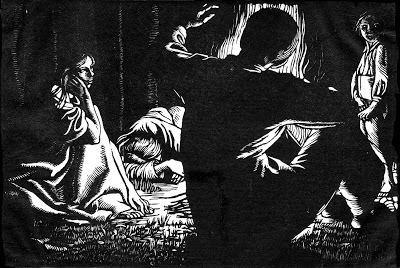 Another example of Gwen Raverat's work. She was one of the first women to be trained at the Slade.
Another example of Gwen Raverat's work. She was one of the first women to be trained at the Slade. I thought 'Period Piece' would be available on Kindle, but it isn't. However, here is the copy that I own, and here is a newer edition, with many rave reviews.
Published on April 12, 2013 16:05
Susan Price's Nennius Blog
"I have made a little heap of all I've found..."
"I have made a little heap of all I've found..."
...more
- Susan Price's profile
- 71 followers



